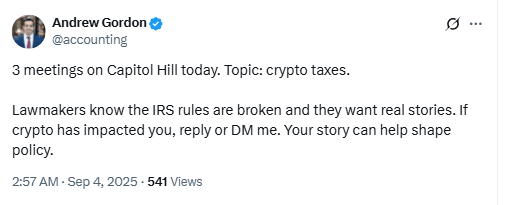As Congress reconvenes after its August recess, the spotlight is back on the future of a potential US central bank digital currency (CBDC). Lawmakers remain divided on whether creating a digital dollar would threaten privacy or simply serve as a political battleground.

Representative Tom Emmer, a vocal critic, has pushed forward the Anti-CBDC Surveillance State Act, which passed the House in July. He warned,

“It is government-controlled, programmable money that, if designed without the privacy protections of cash, could give the federal government the ability to surveil and restrict Americans’ transactions and monitor every aspect of our daily lives.”
Supporters of this view argue that a CBDC could create risks by giving federal authorities direct oversight of personal financial activity. Yet, the Federal Reserve has repeatedly stated that no digital dollar will be launched without explicit authorization from Congress, and any framework would likely involve privacy safeguards.
Expert Views on Privacy and Design Choices
Policy specialists point out that the design of a CBDC would determine its level of privacy. Sheila Warren, CEO of the Project Liberty Institute, stressed that there is no single outcome set in stone.
“You can design a CBDC that has significant blockers and protects privacy. You can design a CBDC… that is fully transparent and has zero privacy blockers. And these are design choices,”
she explained.

She added that the current debate often exaggerates the risks.
“Right now, this idea that a CBDC is some urgent threat to American privacy, I just don’t see it. A lot of the current posture is rhetorical and political in nature,”
Warren noted. Her comments suggest that some arguments in Washington focus more on political positioning than on technical realities.
The US stance stands in sharp contrast to other economies. China has already launched its digital yuan, while the European Union and India are testing pilot projects. According to Warren, this signals
“quite a significant divergence with the US from a lot of other major economies… The US, under this administration and this Congress, has taken a very anti-CBDC stance.”
Wholesale vs Retail CBDCs in the US
Warren drew an important distinction between wholesale and retail CBDCs. Wholesale CBDCs are designed for interbank settlements and may have practical use cases in the American financial system. Retail CBDCs, however, would be consumer-facing digital money.
“In the US, I’ve never thought that a retail CBDC was actually going to happen. Wholesale makes sense. Retail doesn’t,”
she said. This viewpoint reflects the broader skepticism in Washington that a retail digital dollar could be feasible or necessary.
The debate over wholesale adoption aligns with the Federal Reserve’s position that any move toward a CBDC would be slow, cautious, and highly dependent on Congress. Unlike China or India, which have pressed ahead with consumer-focused digital currency pilots, the US appears to be keeping retail CBDCs off the table.
Stablecoins and Privacy Concerns Beyond CBDCs
While lawmakers concentrate on the CBDC debate, stablecoins are expanding rapidly. Congress recently passed the GENIUS Act, establishing a regulatory framework for stablecoins that could boost adoption across the financial sector. Warren suggested this development changes the larger debate.
“Now that we have stablecoins… they’re going to expand and become what I’ve called the jet fuel of the digital economy. That changes the calculus on whether CBDCs are even necessary.”
At the same time, Warren cautioned that more pressing threats to privacy exist outside the CBDC question. “Far bigger threats to my privacy are what’s happening with my data, what I’m giving willingly, what most of us are giving to AI,” she said. She highlighted recent reports that GMC sold driver data, describing it as a more immediate issue than a potential digital dollar.
Her comments redirect attention to data privacy in sectors like artificial intelligence and automotive technology, where personal information is already collected and monetized.
